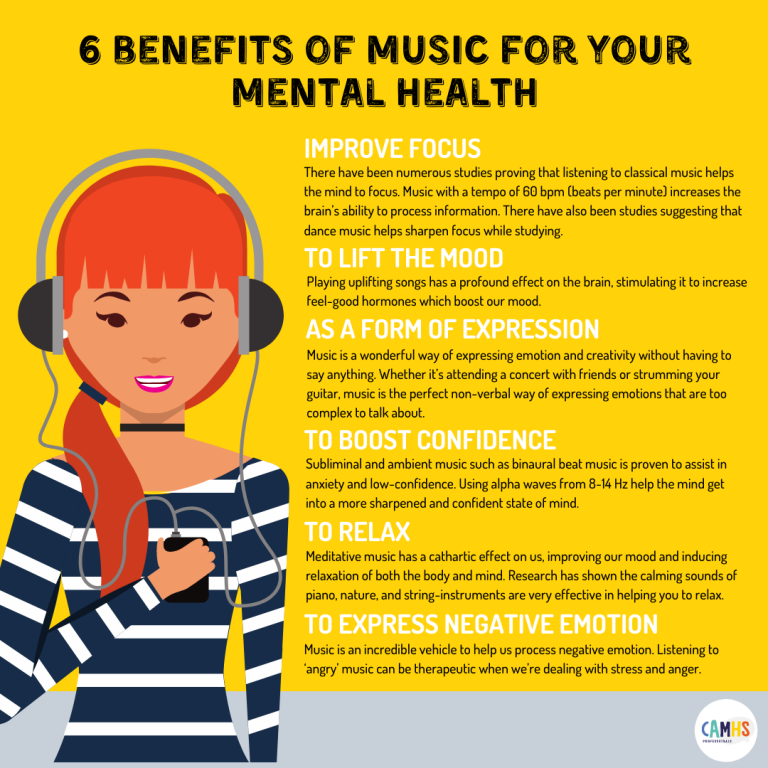The Harmony Within: Exploring the Impact of Music on Mental Health
FACT-CHECKED ✅
Music, a universal language transcending cultures and time, holds a profound influence on human emotions and cognition. Its role in mental health has been increasingly recognised, with studies highlighting its therapeutic potential. This article critically reflects on the multifaceted relationship between music and mental well-being, elucidating the mechanisms through which music impacts the mind and proposing ways to harness its benefits in everyday life.
 |
| Music holds a profound influence on human emotions and cognition. (📷empowerversep) |
Music transcends linguistic and cultural barriers, speaking directly to human emotions. From the soothing melodies of a lullaby to the invigorating beats of a dance track, music has a profound ability to evoke feelings, memories, and even physical responses. Neuroscientific studies reveal that listening to music activates multiple brain regions, including the amygdala, which processes emotions, and the hippocampus, associated with memory. These findings underscore music’s unique power to influence emotional states and foster a sense of connection and identity.
The Science of Music and Stress Reduction
One of the most widely studied benefits of music is its role in stress reduction. Research indicates that slow, calming music can lower cortisol levels, a biomarker of stress, while also reducing heart rate and blood pressure. This physiological response is thought to be mediated by the parasympathetic nervous system, which promotes relaxation and recovery. Moreover, engaging with music—whether through listening, singing, or playing an instrument—has been shown to enhance the release of dopamine, a neurotransmitter linked to pleasure and reward. Such findings provide a biological basis for music’s ability to alleviate anxiety and promote mental well-being.
 |
| (📷camhsprofessionals) |
A Tool for Cognitive Enhancement
Beyond its emotional effects, music can also enhance cognitive functioning. Studies have demonstrated that musical training improves executive functions, such as attention, memory, and problem-solving skills. For instance, children exposed to music education show improved academic performance and higher levels of creativity compared to their peers. Similarly, for adults, listening to music while performing tasks can improve focus and productivity, particularly when the music is instrumental and low in complexity. These cognitive benefits underscore the potential of music to enhance mental resilience and adaptability.
Therapeutic Applications
Music therapy has emerged as a promising intervention for a wide range of mental health conditions, including depression, anxiety, and traumatic stress disorder (PTSD/C-PTSD). In clinical settings, therapists use music to facilitate emotional expression, improve mood, and enhance social connections. For example, group drumming sessions have been shown to reduce symptoms of depression and increase feelings of social support among participants. Additionally, personalised playlists tailored to an individual’s preferences can serve as a self-regulation tool, helping them navigate difficult emotions and foster a sense of empowerment.
Sociocultural Dimensions
Music also serves as a powerful medium for cultural expression and collective healing. Across societies, music plays a central role in rituals, celebrations, and communal activities, fostering a sense of belonging and shared identity. During times of crisis, such as the COVID-19 pandemic, people turned to music as a source of solace and resilience, participating in virtual concerts and creating community through shared musical experiences. These examples highlight the role of music in strengthening social bonds and promoting emotional recovery.
While the benefits of music are well-documented, there are challenges to its integration into mental health care. Accessibility and cultural relevance remain critical considerations, as not all individuals have equal access to musical resources or resonate with the same genres. Additionally, more research is needed to understand the long-term effects of music-based interventions and their potential risks, such as over-stimulation or emotional triggers in certain contexts. Future studies could also consider developing evidence-based guidelines for incorporating music into diverse mental health practices.
 |
| Music transcends linguistic and cultural barriers, speaking directly to human emotions. (📷empowerversep) |
Music is more than an art form; it is a profound tool for enhancing mental health and fostering human connection. By understanding the mechanisms behind music’s impact on the brain and emotions, we can harness its potential to promote resilience, healing, and well-being. As research continues to unveil the depths of music’s influence, its integration into mental health care offers a hopeful avenue for addressing the complex challenges of emotional and psychological well-being.
⭐⭐⭐
'Music for Health and Well-being with Annie Heiderscheit : CIMTR opening lecture 2023'
▶️ 1h08m52s Cambridge Institute for Music Therapy Research


